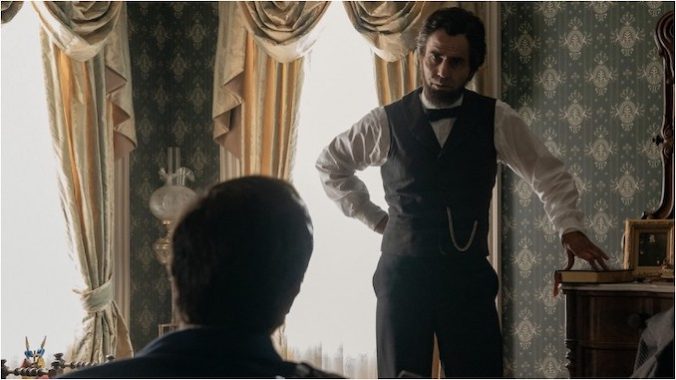In Manhunt, Abraham Lincoln and Edwin Stanton Are History’s Greatest Bromance
Photo Courtesy of Apple TV+

Apple TV+’s historical thriller Manhunt is, like many period dramas, a story that’s emotionally driven by a central relationship. Just not quite in the way many people have likely come to expect. The story of the aftermath of President Abraham Lincoln’s assassination, the seven-part series is one part crime drama, one part legal procedural, and one part political history lesson. It is the story of the man charged with hunting a murderer, and the killer who tried to bring down a nation. But, like so many other historical dramas that have come before it, Manhunt is also a love story, just one between two friends who dreamed of changing America for the better, and the one who was left behind to try and finish the work of doing so alone.
While, on paper, Manhunt is quite correctly framed as a high-stakes cat-and-mouse chase between Secretary of War Edwin Stanton (Tobias Menzies) and assassin John Wilkes Booth (Anthony Boyle), but at its heart, it’s the story of the abiding, deep friendship between President Abraham Lincoln (Hamish Linklater) and his war secretary. But the pair isn’t just a simple bromance. The series recontextualizes Stanton and Lincoln’s bond as a key driver of public policy, not just during the war but afterward. It is the war secretary’s abiding affection for his lost friend that drives him to honor his memory, both by catching the man who killed him and by obsessively shepherding his vision for the future of the country in the wake of his death. And make no mistake, Stanton risks everything: his political future, his marriage, even his own health, all in the name of getting justice for Lincoln’s murder and honoring the world the two of them planned to build together. That’s some serious soulmate shit, if you ask me.
Though our modern pop culture has made tremendous strides in terms of representation, it still tends to assume that male characters—particularly those coded as traditionally masculine, including well-known heroes and famous leaders—automatically default to stoic, stubborn, emotionally repressed types. They’re rarely allowed to express deep feelings and almost certainly never toward one another. Usually, they’re allowed to be upset if someone is dead, but not too much, and they’re rarely able to be soft and vulnerable with one another about either the things they long for or the things they fear. At first glance, it seems that Manhunt may follow a similar path, showing us a briefly emotional Stanton at a dying Lincoln’s bedside before briskly launching into the logistics of Booth’s escape. But while the show may begin with the president’s death, it deftly incorporates flashbacks throughout each episode that allow us to see the depth of his bond with Stanton for ourselves.
-

-

-

-

-

-

-

-

-

-

-

-

-

-

-

-

-

-

-

-

-

-

-

-

-

-

-

-

-

-

-

-

-

-

-

-

-

-

-

-








































